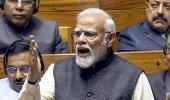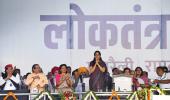If the BJP gets only 200 seats and wants to remain in power, Modi will have to make way -- either for a proxy of his choice, or for an internal rival, predicts Nilanjan Mukhopadhyay.

Parakala Prabhakar, the noted Indian political commenter and analyst, recently made several startling claims in an interview to Rediff.com. He thereafter, made similar points in the course of a video interview too.
Because he is no social media warrior prone to making stunning statements with the intention of increasing the number of 'followers', his arguments needs to be taken seriously.
Mr Prabhakar has been in the political arena for more than a quarter of a century in the course of which he has not only been an official spokesperson of the Bharatiya Janata Party, but also been a member of the Praja Rajyam Party.
It is common knowledge that having a ringside view of politics for long is particularly beneficial when assessing the immediate and long-term road map ahead, especially if one is not aligned with any political party, as Mr Prabhakar is currently.
In the years that he has been in public life, he was also an advisor to the Andhra Pradesh government and then chief minister Nara Chandrababu Naidu, while holding a cabinet rank. The fact that Mr Prabhakar is also the spouse of current Finance Minister Nirmala Sitharaman makes his voice truly redoubtable.
In the aforesaid interviews he asserted that 'Modigate is snowballing into a huge thing with the electorate. (The BJP is) in for huge punishment by the electorate.' Before going further, it is important to understand what he means by Modigate, a word with roots in the scandal that led to the collapse of the American presidency way back in the early 1970s.
Modigate, according to Prabhakar, is the electoral bonds 'scam' and that the people are seething in anger against the BJP and are not going to waste the opportunity during the Lok Sabha elections to punish the party and its supremo, Prime Minister Narendra Modi.
Related to this is another of his important assertions: 'Modi-fatigue has set in because the prime minister is over-exposed. From his trips to the sky, to the bottom of the sea, there is nothing left where he has not been.'
Quite clearly, Parakala is asking the intelligentsia to comprehend a reality that is overlooked in backdrop of Modi's perpetual publicity blitzkrieg. That the novelty or newness that that Modi represented in 2014, or even in 2019, is now passe.
Mr Prabhakar's other prophesies for the Lok Sabha elections are:
- The BJP leadership is rattled after sensing huge rejection of the government's wrongdoings.
- The contest is not between parties. Instead it's between the BJP and Modi on one side, and the people on the other side.
- Post electoral-bonds scam BJP has lost the na khaoonga, aur na khane doonga moral high ground.
- It is very-very difficult for the BJP to return to power -- there's just an outside chance.
- With great difficulty the BJP may touch 200.
In the event of Mr Parakala's forecast actually turning true, what will be the nature of governance, who will be the next prime minister of India and which parties shall be in the coalition?
Before getting to the specifics, it must be first noted that if the BJP's tally indeed drops below 200 or hovers around that figure, it would mean a return to the coalition era -- the single-party majority governments of 2014 and 2019 would be once again in the past like it was after 1984.
Unlike the viewpoint, pushed by Modi and his party over the past decade, coalitions do not retard development and growth and enhance government. Contrarily, periods when India registered high-growth various coalition governments were at the helm.
Moreover, democracy was more functional, decentralisation was the norm and consensual politics was the credo of the times.
If the BJP is reduced to a sub-200 mark, it will remain the single largest party and the President, citing precedents starting with 1996, will first ask the party to form a government.
It may be very difficult for the BJP to must support of seventy plus Lok Sabha MPs from various parties with Modi remaining at the helm, as within the BJP too, knives will be out and other leaders will fancy their chances.

It is very difficult to say who will throw their hats in the ring at that stage and who will be backed by the Rashtriya Swayamsevak Sangh which will again be politically ascendant.
In all likelihood, if the BJP is to remain in power, Modi will have to make way -- either for a proxy of his choice, or for an internal rival. Furthermore, any such government will have to be more consensual as coalition partners will account for almost twenty five percent of the Treasury Benches in the Lok Sabha.
Effectively, this will put the clock back to the Vajpayee-era style of governance where some stalwarts from coalition partners had equal voice in the Union Cabinet when compared with those from the BJP.
Even if Modi clutches on to office, he will have to considerably alter his style and persona -- the government cannot be completely centred on him. He will be considerably enfeebled.
If the BJP tally is down by around 100 seats, this gain will be mainly shared by the Congress, its allies in north and western India and by other regional parties in the rest of India.
The Congress tally in such a scenario will be around the 100 mark and it will also be the second largest party in Lok Sabha.
In the event of the BJP deciding not to, or being unable to form the government, the call to form the government shall be directed to the Congress, or it is possible that the INDIA bloc may make a successful collective bid.

There are two questions at this stage: One, will the Congress be part of the government as in 2004 and 2009, or will it extend support from outside, like it in 1996 when it backed the National Front government after the BJP could not muster support in Parliament and resigned after just 13 days in office?
The second question will arise if the Congress chooses to be part of the government. In that case, will it decide that Rahul Gandhi will be the PM or will it opt for some other like, maybe Mallikarjun Kharge or yet another dark horse?
In the event of the Congress deciding to lend outside support to the new coalition, who has the most likely chance of becoming PM?
The answer to this question will depend on whether the INDIA parties limit the choice among themselves, or if they decide that leaders of other non-BJP parties too can be considered.
At that stage, it will all depend on the numbers with each of the regional parties; how many seats have been won by the Samajwadi Party, Rashtriya Janata Dal, Nationalist Congress Party, Dravida Munnetra Kazhagham, and even the Trinamool Congress although it is currently not part of the Opposition alliance.
In the event of what Mr Prabhakar has envisaged comes true on June 4, when the totals stored in the EVMs are added up, India may go through a series of uncertainties but in the end there shall be a government in place and a new phase of governance and history will begin.
For that to happen, the 2024 elections once again cannot be one 'single election' with an overarching narrative like in 2014 and 2019, but it will have to be an aggregate of 543 elections -- each different with a different challenger to the ruling party, but driven by the voters' decision to vote the BJP out of office.
Nilanjan Mukhopadhyay is an author and journalist based in Delhi-NCR. His latest book is The Demolition, The Verdict and The Temple: The Definitive Book on the Ram Mandir Project. He is also the author of Narendra Modi: The Man, The Times.
Feature Presentation: Aslam Hunani/Rediff.com










